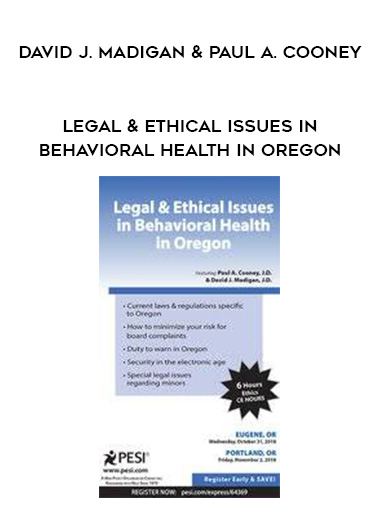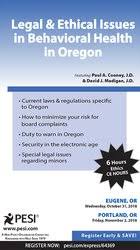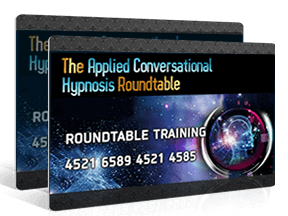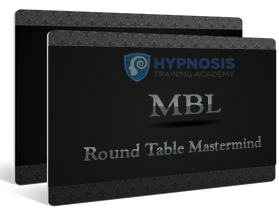
David J. Madigan & Paul A. Cooney – Legal & Ethical Issues in Behavioral Health in Oregon
A better understanding of your ethical and legal obligations can not only help you provide more effective treatment to your clients, but can help you avoid costly mistakes. This seminar will provide you with the necessary tools to avoid a wide range of ethical and legal pitfalls.
If you watch only one seminar recording this year, make it this one. Join attorney Paul Cooney for an entertaining and enlightening day and leave with a greater understanding of the latest Oregon law as it relates to mental health. You will take home practical strategies to minimize and manage legal and ethical risks and you will learn how to immediately implement these risk reducing strategies into your practice.
- Develop policies on ethical issues such as restraints, seclusions and informed consent.
- Designate the treatment provider’s responsibilities relating to mental health issues and duty to warn law in Oregon.
- Explore the legal and ethical considerations for the treatment of minor populations in Oregon with regard to age of consent, confidentiality and custody concerns.
- Establish practices for ensuring HIPAA compliance to protect client’s privacy and minimize risk of litigation.
- Compare the different requirements for responding to subpoenas and court orders for mental health records.
- Determine the legal considerations for a clinician to be prepared when called for a deposition.
Professional Ethics and Boundary Issues
- Informed Consent Issues
- Ethics & Board Complaints
Legal Liabilities of the Professional
- Current Litigation Trends & Liability for Lost Data
- Clients Who Threaten You or Your Staff
- Business Issues for the Private Practitioner
- Duty to Warn
Balancing the Rights of Minors & Parents
- Minors Rights
- Age of Majority
- Access to Records
- Rights of Minors to Refuse/Consent to Medication and Treatment
- Parental Rights
- Custodial and Divorce Factors
- Child Abuse Allegations
- Custodial vs. Non-Custodial Parent’s Rights to Records
Confidentiality of Mental Health Records
- When and to Whom Records Can Be Released
- Mandatory Disclosure Requirements
- Alcohol/Drug and AIDS/HIV Treatment Records
- Necessary Documentation
Compliance with HIPAA and State Confidentiality Laws
- What protections are necessary to insure compliance?
- What are the potential liability issues for breaches of confidentiality?
- What are the “best practices” for health care providers to insure compliance?
Responding to Subpoenas, Court Orders and Law Enforcement
- Subpoenas
- Types of Subpoenas
- Duty to Respond
- Time Limits
- Court Orders
- Duty to Respond
Litigation Issues
- How to Prepare for a Deposition
- Documentation Issues
- What Can Be Done in Advance to Better Protect the Provider and the Clients
What is health?
The word health refers to a state of complete emotional and physical well-being. Healthcare exists to help people maintain this optimal state of health.
According to the Centers for Disease Control and Prevention (CDC), healthcare costs in the United States were $3.5 trillionTrusted Source in 2017.
However, despite this expenditure, people in the U.S. have a lower life expectancy than people in other developed countries. This is due to a variety of factors, including access to healthcare and lifestyle choices.
Good health is central to handling stress and living a longer, more active life. In this article, we explain the meaning of good health, the types of health a person needs to consider, and how to preserve good health.
In 1948, the World Health Organization (WHO)Trusted Source defined health with a phrase that modern authorities still apply.
“Health is a state of complete physical, mental, and social well-being and not merely the absence of disease or infirmity.”
In 1986, the WHOTrusted Source made further clarifications:
“A resource for everyday life, not the objective of living. Health is a positive concept emphasizing social and personal resources, as well as physical capacities.”
This means that health is a resource to support an individual’s function in wider society, rather than an end in itself. A healthful lifestyle provides the means to lead a full life with meaning and purpose.
In 2009, researchers publishing inThe LancetTrusted Source defined health as the ability of a body to adapt to new threats and infirmities.
They base this definition on the idea that the past few decades have seen modern science take significant strides in the awareness of diseases by understanding how they work, discovering new ways to slow or stop them, and acknowledging that an absence of pathology may not be possible.
David J. Madigan & Paul A. Cooney – Legal & Ethical Issues in Behavioral Health in Oregon
Readmore About : David J. Madigan & Paul A. Cooney








































Reviews
There are no reviews yet.